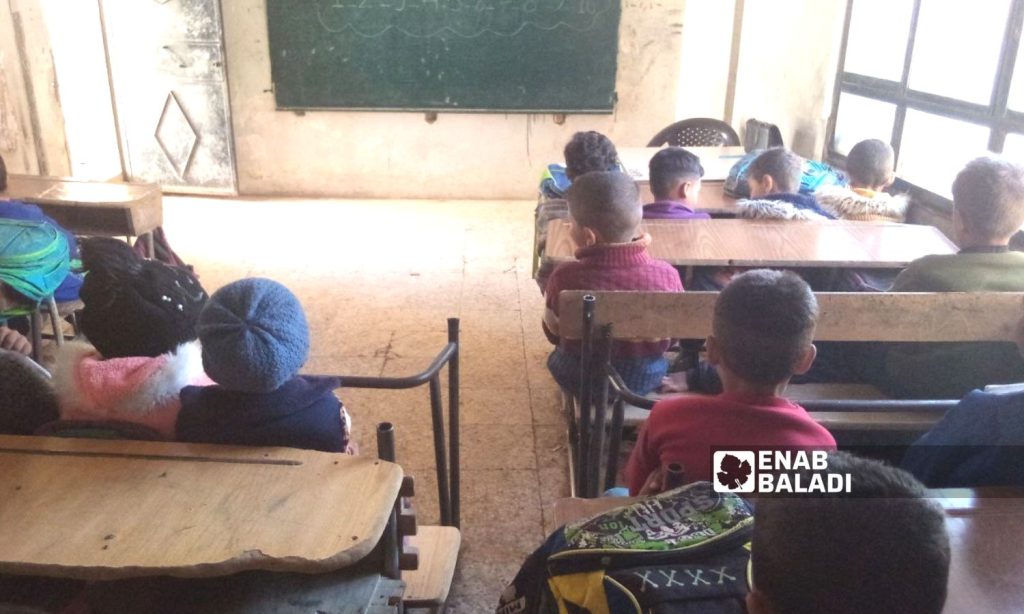Daraa – Halim Muhammad
The shortage of teaching staff in some schools in Daraa governorate has imposed an additional economic impact on the family, which is forced to subject their son or daughter to private lessons, especially for high school students, who are a step away from university life.
Some schools in the countryside of Daraa suffer from a shortage of teachers in the philosophy course for students of the literary secondary stage, in addition to a shortage of teaching staff in the English and Arabic language courses and mathematics, one of the most prominent subjects in the scientific branch.
Enab Baladi monitored the complaints of some parents about the lack of teaching staff, which affects the level of their children and their readiness for high school exams, which families sought to avoid through private lessons despite the financial burden entailed.
Costly solutions
Aya, a baccalaureate student in a school in the western countryside of Daraa, said that she and her classmates had not taken any lessons in philosophy since the beginning of the second semester after the only subject teacher left work at the school.
Aya expressed to Enab Baladi her fears about the possibility of her low level in the secondary school exams, so she turned to private lessons in the subjects of English language and philosophy.
She explained that her family pays 5,000 SYP for each private lesson for each of the two subjects, for which she receives two lessons for each of them per week, which means that the weekly cost of her lessons is 20,000 SYP (about $3).
The private lesson includes three students, usually for an hour and a half, each of whom pays five thousand pounds for each lesson, which is an unfixed amount, and varies according to the competence of the teacher and the number of students.
In the face of the disparity in the financial capabilities of the families, in light of the deteriorating economic conditions in all regions of Syria, Shahad is seeking to compensate for her inability to pay for the tutoring sessions of the high school curriculum via YouTube, as a less expensive alternative to these lessons, but at the same time it is less useful, she told Enab Baladi.
In addition to the lack of teaching staff, school students in the southern governorate suffer from crowded classrooms, which can accommodate 40 students.
In addition to the absence of teachers, this threatens to have a negative impact, especially on high school students in the scientific branch, whose curriculum requires an explanation and simplification of the curriculum, more than what is required for students in the literary section.
Fares, a scientific baccalaureate student, indicated to Enab Baladi that his way to overcome this situation is the private lessons he receives with some of his colleagues, specifically in mathematics, in which the cost of the lesson does not differ from the subjects of Arabic, English, and philosophy.
In the 2022 academic year, the success rate in the regime-held areas for the secondary school certificate and its branches was 55.24% for students in the scientific section, 53.98% for students in the literary section, and 65.19% for Sharia high school students, according to the regime’s education ministry.
Lack of specialization, low salary
The significant shortage of language specializations within schools is usually in the Arabic language due to the tendency of teachers to emigrate since 2011, in addition to low wages, which pushes teachers towards private schools and lessons, says a Western language teacher in a school in the western countryside of Daraa.
The teacher, who asked not to be named for security reasons, also pointed out to Enab Baladi that there is a weakness in hiring university graduates who are already specialized in languages, which some schools tend to avoid by hiring graduates of the Elementary Teaching department or allow university students to teach English, for example, even though they do not specialize in it.
Abdul Karim, an Arabic language teacher, was prompted by economic difficulties to leave the teaching profession and resort to working in livestock breeding because his monthly salary does not cover the living requirements for him and his family.
Teachers receive a monthly pension ranging between approximately 130,000 and 150,000 Syrian pounds since the latest salary increase in December 2021, when it came at a rate of 30% for workers and employees and 25% for retirees.
Syria also ranked 18th out of 117 countries in the worker poverty rate index in 2022, according to the International Labor Organization (ILO).
In the same context, the teacher gets 15,000 to 20,000 Syrian pounds for one private lesson.
($1=7550 SYP) according to the S-P Today website, which covers the trading rate of the Syrian pound to the dollar
In September 2022, hundreds of students in Tafas town staged a protest due to the deterioration of the educational situation and demanded improvement in the services provided by the Daraa Education Directorate to the governorate’s schools.
The number of children deprived of education in Syria during the past ten years topped two million children, the United Nations Children’s Fund (UNICEF) reported in January 2022.

